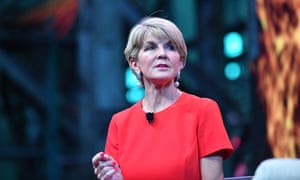Former foreign minister says Banks ‘would have thought long and hard about her decision’ to quit the Liberals
The former foreign minister Julie Bishop has described Julia Banks as a “strong sensible centrist” and warned against political parties embracing populist policies.
Speaking at an Ernst & Young conference on Cockatoo Island, Bishop, now a backbencher after her party rebuffed her bid for the leadership, said Banks “would be missed” following her decision leave the Liberal party to sit on the crossbench.
Far from criticising her colleague, Bishop said: “I am sure she thought long and had about her decision.”
She then added that “no political party could meet its potential” unless it sought to achieve equal number of women in its ranks.
She said it highlighted the challenge for the Liberal party to promote women and establish a pipeline of talent willing to enter politics.
Banks has been outspoken during her time as the Liberal MP for Chisholm about the need to achieve equality in politics and has been highly critical of the Liberal party’s record.Speaking at an Ernst & Young conference on Cockatoo Island, Bishop, now a backbencher after her party rebuffed her bid for the leadership, said Banks “would be missed” following her decision leave the Liberal party to sit on the crossbench.
Far from criticising her colleague, Bishop said: “I am sure she thought long and had about her decision.”
She then added that “no political party could meet its potential” unless it sought to achieve equal number of women in its ranks.
She said it highlighted the challenge for the Liberal party to promote women and establish a pipeline of talent willing to enter politics.
Several Liberal women criticised members of their own party over what they saw as bullying and harassing behaviour during the leadership challenge. Banks, a former corporate lawyer was a staunch supporter of the former prime minister Malcolm Turnbull.
She referred to a global Pew Foundation study on democracy and noted that the Australian result on trust in democracy was “not as high as I would have hoped.”
She said only 7% reported a high level of trust that their national government was doing the right thing, though 47% had some level of trust.
“Why is it so? Politicians have to honour their commitments and people want to hear the truth, the facts. They are over populist policies,” she said.
She also appeared to endorse a bipartisan approach to developing an energy policy, though she did not directly back the national energy guarantee as the answer.
“The ground must be fertile to have a negotiation because business is demanding certainty,” she said. “Business needs confidence to make investments in generating capacity. I am agnostic on what type.”
She declined the invitation to analyse the results of the Victorian election.
But she said: “We can talk about populism. Populism is when you have a political leader who embraces policies knowing that will have a negative impact long term. Then you really have to ask yourself about that policy.”
She called for evidence-based policies, and strongly criticised the 24 hour media cycle for diminishing the quality of debate.
“Let’s take an example of US. The country is deeply polarised. They might as well be two different countries. We need to have sensible debates about issues. I think we will respect a politician who says I am going to tell you the truth not what you want to hear.”
Asked about leadership qualities Bishop said: “My advice is never lose your composure and know your brief inside out.”
She said she had used this tactic on the Russian president, Vladimir Putin, when talking directly to him on the shooting down of flight MH17 over the Ukraine in 2014. Several Australians were killed.
She said: “He replied, in perfect English: ‘You call that a shirt front?’”

No comments:
Post a Comment